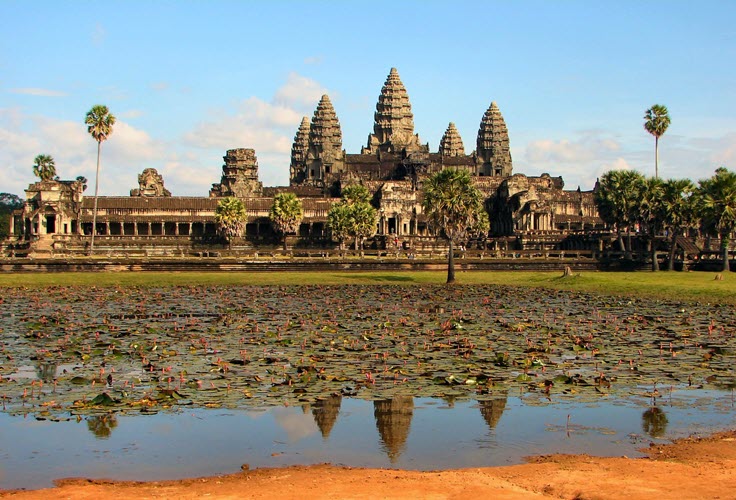Cambodia Independence Day: History Theme, and Significance

Cambodia Independence Day, also known as National Day, is celebrated on November 9th each year. This significant national holiday commemorates the country’s independence from France, which was officially recognized on November 9th, 1953. Cambodia’s struggle for independence was a pivotal moment in its history, marking the end of its status as a French protectorate.
On this day, various events and celebrations take place throughout the country, including patriotic ceremonies, parades, cultural performances, and fireworks displays. The day serves as an occasion for Cambodians to reflect on their nation’s history, honor their cultural heritage, and celebrate the achievements and progress made since gaining independence.
History of Cambodia Independence Day
Cambodia Independence Day commemorates the country’s independence from French colonial rule. The history of Cambodia’s struggle for independence is characterized by a series of movements and political developments that culminated in the recognition of its sovereignty. Here are key historical events leading to Cambodia Independence Day:
- French Protectorate: Cambodia became a French protectorate in 1863, effectively placing the country under French colonial rule. The French colonial administration imposed its authority over Cambodia, introducing political and social reforms that favored French interests.
- Anti-Colonial Movements: In the early 20th century, Cambodia saw the emergence of various anti-colonial movements and nationalist sentiments aimed at liberating the country from French rule. These movements advocated for independence and self-determination, sparking resistance against colonial authorities.
- Kingdom of Cambodia: Efforts to secure Cambodia’s independence were further supported by the country’s monarch, King Norodom Sihanouk. His diplomatic initiatives and negotiations with the French government contributed to the eventual recognition of Cambodia’s sovereignty.
- Independence Declaration: On November 9th, 1953, Cambodia’s independence was formally recognized following negotiations with the French government. This significant milestone marked the end of the French protectorate and the beginning of Cambodia’s status as a sovereign nation.
- Post-Independence Challenges: Despite gaining independence, Cambodia faced numerous internal and external challenges, including political instability, conflicts, and social upheavals that significantly impacted the country’s development and progress.
Since achieving independence, Cambodia has undergone significant political and social transformations, striving to build a stable and prosperous nation. Cambodia Independence Day serves as a reminder of the country’s resilience and determination to safeguard its sovereignty and national identity. It is a time for Cambodians to reflect on their history, honor their cultural heritage, and celebrate the progress made since gaining independence.
Significance of Cambodia Independence Day
Cambodia Independence Day holds great significance for the country and its people for several reasons:
- Historical Pride and Identity: The day serves as a symbol of national pride and identity, commemorating the country’s liberation from colonial rule and its establishment as a sovereign nation. It is a reminder of Cambodia’s rich history and the struggles endured to secure its independence.
- Celebration of Freedom: Cambodia Independence Day is a time for the nation to celebrate its freedom and self-determination. It highlights the importance of sovereignty and the right of the Cambodian people to govern themselves and determine their own destiny.
- Unity and Patriotism: The day fosters a sense of unity and patriotism among Cambodians, promoting a shared national identity and a collective spirit of pride in the country’s cultural heritage and achievements.
- Reflection on Progress: Cambodia Independence Day provides an opportunity for reflection on the nation’s progress since gaining independence. It encourages the evaluation of the country’s advancements in various sectors, including politics, economy, culture, and social development.
- National Solidarity: The day encourages solidarity and collaboration among Cambodians, fostering a sense of togetherness and mutual support as the nation continues to address challenges and work towards a brighter future.
- Cultural Celebration: Cambodia Independence Day is often marked with cultural festivities, including parades, traditional performances, and public events that showcase the country’s rich cultural heritage and traditions, reinforcing the importance of preserving Cambodian culture and values.
By emphasizing the significance of Cambodia Independence Day, the nation reaffirms its commitment to upholding the principles of freedom, democracy, and unity, while striving for sustainable development and prosperity for all its citizens.
Events at Cambodia Independence Day
Cambodia Independence Day is celebrated with various events and activities that honor the country’s independence and foster a sense of national pride and unity. Some common events that take place on this day include:
- Flag Raising Ceremonies: Official ceremonies are held across the country, including the capital city of Phnom Penh, where the national flag is raised to commemorate the anniversary of Cambodia’s independence.
- Parades and Processions: Colorful parades and processions featuring marching bands, cultural performances, and traditional costumes are organized to showcase Cambodia’s rich cultural heritage and historical significance.
- Cultural Festivals: Cultural festivals and fairs are held, featuring traditional music, dance performances, arts and crafts exhibitions, and local cuisine, providing an opportunity for Cambodians to celebrate their diverse cultural traditions.
- Patriotic Speeches and Addresses: Government officials, community leaders, and public figures deliver patriotic speeches and addresses that highlight the significance of Cambodia Independence Day and emphasize the importance of unity, freedom, and national progress.
- Public Gatherings and Celebrations: Public gatherings and celebrations are organized in communities and public spaces, bringing people together to participate in various recreational activities, games, and festive events that promote a sense of community and camaraderie.
- Ceremonial Wreath Laying: Ceremonial wreath-laying ceremonies are conducted at national monuments and memorials, honoring the sacrifices of those who played a significant role in Cambodia’s struggle for independence.
These events collectively contribute to the commemoration of Cambodia Independence Day, fostering a spirit of national pride, cultural appreciation, and unity among Cambodians as they reflect on their history and look toward the future with hope and optimism.
Observer Voice is the one stop site for National, International news, Sports, Editor’s Choice, Art/culture contents, Quotes and much more. We also cover historical contents. Historical contents includes World History, Indian History, and what happened today. The website also covers Entertainment across the India and World.

